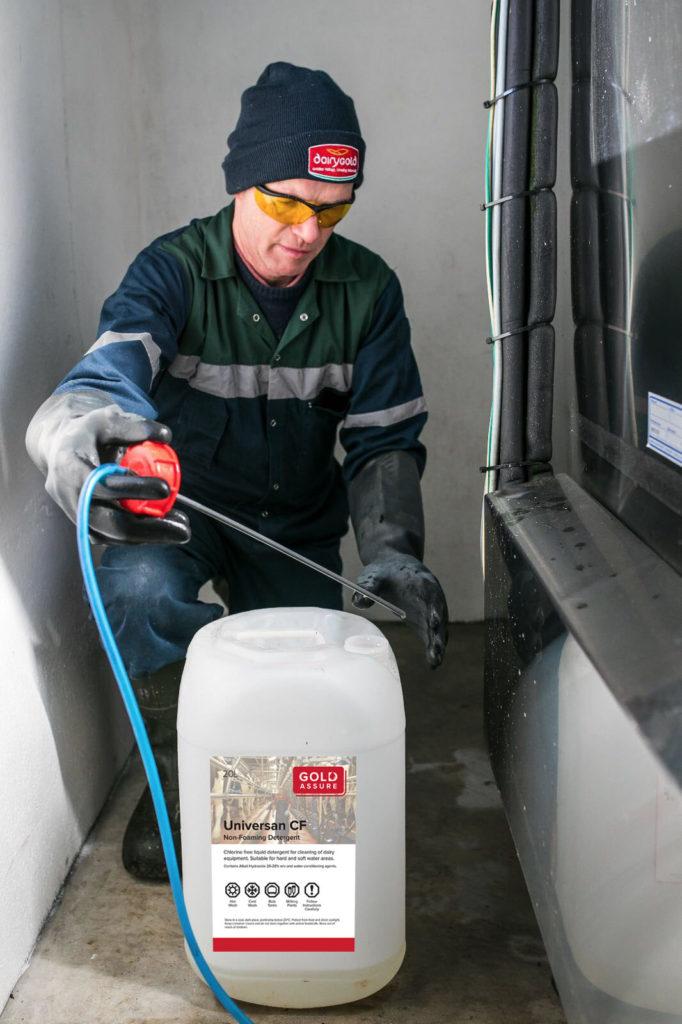Get a 24 hour weather forecast

By Catherine Hurley
Chlorates can arise when drums of caustic chlorine-based detergents are stored on a farm for long periods of time. The chlorine breaks down in the drum and Chlorates are formed. The presence of Chlorates in milk powder is of concern for infant formula manufacturers as they affect the iodine metabolism in infants and are therefore a concern to the industry.
We are well below the specifications required when it comes to residues, but it’s about marketing and remaining competitive alongside other countries and staying slightly ahead of them.
The allowable limit for Chlorates in milk is 0.00375mg/kg. Dairygold will be testing all suppliers for Chlorates in 2019. Any supplier with a Chlorate level greater than the allowable limit will receive a farm visit from their Milk Advisor to review farm wash routines and will be required to implement a chlorine-free wash programme. Suppliers should only use detergents and teat disinfectants from the Teagasc recommended lists.
TCM residues in dairy products are of significance in butter. From a marketing perspective, these levels are of increasing concern among Dairygold’s key international customers. Therefore, we intend on continuing the TCM testing Programme including it formally in the Milk Processing Terms & Conditions in 2020.
The allowable limit for TCM in milk is 0.00155mg/kg and this is influenced by cleaning and disinfection routines which use detergents containing chlorine. In 2019, all Milk Suppliers will be tested across the year.
How to maintain low Chlorate and TCM levels;
The use of chlorine for milking equipment has more recently come under the spotlight and will possibly become an issue coming down the road. Many co-operatives are being proactive about the situation and providing Chlorine Free detergents.
Why switch to a Chlorine Free wash routine
Incorrect use of chlorine-based products can lead to some residues in milk. The most important thing farmers need to do to minimise residues, is to stick to the protocol given on the product label when washing equipment, whether it includes chlorine or not.
Best results can be seen by farmers following the instructions on the label and adhering to the routine, especially when it comes to residues in the TCM and chlorate, regardless whether the chlorine is used in the wash routine or not.
Fourteen litres (3 gallons) of water per milking unit is required to remove milk or detergent residues.
However, taking away Chlorine also takes the ‘edge off the sword’ when washing milking equipment, and the only replacement is hot water heated above 50°C and plenty of it.
Some farmers have difficulty in supplying sufficient hot water to the milking parlour for the equipment because of the costs in doing so, as well as the amount generated.
A new diesel-powered continuous flow boiler can supply sufficient hot water at a rate of 20L of heated water per minute, adequate for any milking parlour.
The Dairy Geyser is a portable water heater can save farmers 75pc of running costs compared to traditional electrical water heaters based on day time electricity, according to Syl Lyster the Marketing Sales Executive at Dairy Geyser.
According to Syl, savings of up to €1,000 can be made annually by using the Dairy Geyser, compared to a traditional electric water heater with a water usage of 100,000L per year.
Although it will predominantly be used in the milking parlour, because it’s portable it could also be used to clean down sheds and in particular calf houses, where an accumulation of bacteria can lead to major health issues.
Developer of the instant hot water system and CEO of Dairy Geyser, Martin Deady says it can provide instant hot water without the need of water storage on demand and is not chained to one task.
The design is simple, it has an inlet to take cold water and an outlet for hot water, which can be attached to the power machine or milking equipment.
“It’s very convenient for farmers because they can fit and service the heaters themselves,” according to Syl.
The Dairy Geyser claims to be the only fuelled heater on the market and the only heater that can produce sufficient quantities of potable water at adequately high temperatures to guarantee a low bacteria count.
The Dairy Geyser Water Heater was awarded the National Dairy Innovation Engineering Gold Award and the Overall Innovation Award at the National Dairy Show in Millstreet, 2017. More recently the team was awarded the Agri Tech Start Up Award at the Innovation Awards at the 2018 Ploughing Championships.
The Dairy Geyser is retailing at €2,850 excluding VAT and is now available to buy in some Dairygold superstores or alternatively, can be bought on our website here.